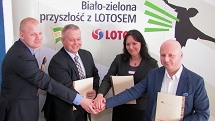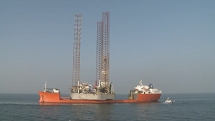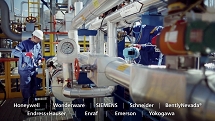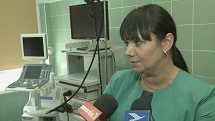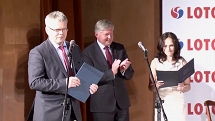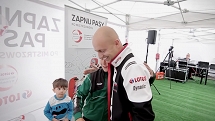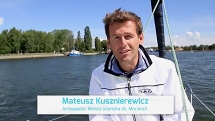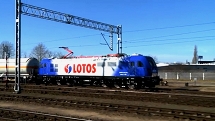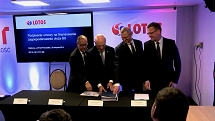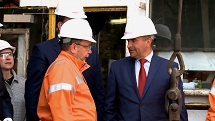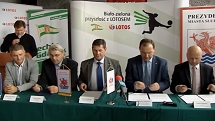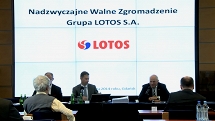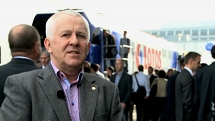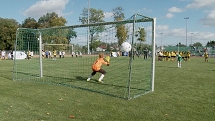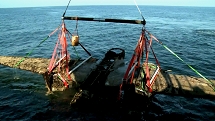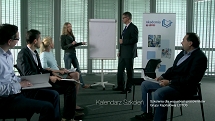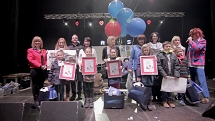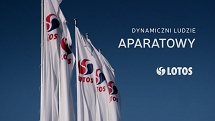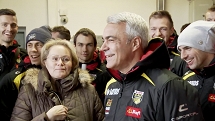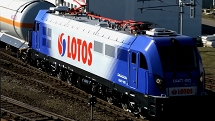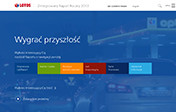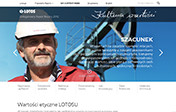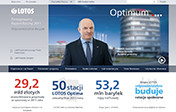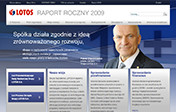-
Financial information
The past year ushered in a series of challenges for the companies in the fuel sector. The decisions made by us have demonstrated that we are able to take rapid steps to adapt to a demanding environment and ensure the desired profitability for our projects.
-
Segment performance
The segmental management model we have implemented enhances management efficiency, delivering cost and revenue synergies across the organization.
-
Letter from the Vice-President of the Board
2014 ushered in a series of challenges for the companies in the fuel sector. The decisions made by the LOTOS Group have demonstrated that we are able to take rapid steps to adapt to a demanding environment and ensure the desired profitability for our projects.
-
Business environment
The key factor that had a strong impact on both the global and Polish petroleum markets in 2014, with significant consequences for the LOTOS Group’s performance, was the price of crude oil, which also determined the price of petroleum products.
-
Strategic objectives
The LOTOS Group’s Strategy is designed to strengthen our position as a strong, innovative and efficient business which plays a major role in ensuring national energy security.
-
Business model
Our operations consist in crude oil production and processing, as well as wholesale and retail sale of petroleum products, among which are: fuels (unleaded gasoline, diesel oil and light fuel oil), heavy fuel oil, bitumens, aviation fuel, naphtha, propane-butane LPG and base oils.
-
Risk and opportunities
At the LOTOS Group, we identify a range of diverse risks, which may affect all areas of our business. The key risks in terms of their impact on our operations are the financial risks as well as risks affecting the exploration and production area. In the analysis of the risks, we also factor in issues related to sustainable development.
-
Key data 2014
With revenue of ca. PLN 28.5bn in 2014, we rank fourth in the group of 500 largest businesses in Poland.

Responsible employer
In line with the key objectives of our corporate social responsibility strategy for 2014, we continued to secure highly qualified employees in a number required to successfully implement the LOTOS Group’s business strategy, and worked on improving our organizational culture based on adopted values.
STATEMENT
Enhancing our corporate culture based on adopted values is one of the main objectives of our CSR strategy for 2012-2015. To a large extent, its implementation relies on the conclusions and opinions of our staff, for instance those gathered during the 2013-2014 employee engagement and satisfaction survey performed at the LOTOS Group, which was a valuable source of information.
Iwona Stankiewicz-Dąbek
HR Processes Team Manager, Grupa LOTOS
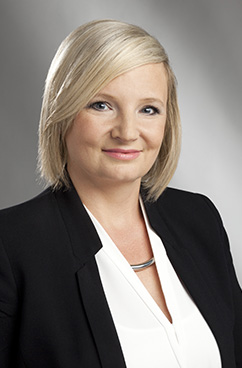
The aim of the survey, carried out using Aon Hewitt’s methodology, was to learn about the employees’ opinions and attitudes and to monitor their satisfaction and engagement to create a work environment that would facilitate the achievement of business objectives.
The survey results allowed us to see our strengths and weaknesses and to prepare Improvement Plans for all LOTOS Group companies with a view to raising staff efficiency in the long run. The survey and the Improvement Plans are conscious efforts to create an organization based on modern management practices and owing its competitive edge to the ability to optimally harness and channel its employees’ commitment. The Plans are being implemented in accordance with the rules worked out together with the employees and management staff.
As the scores for employee engagement achieved in the survey were high (65% on average), i.e. typical of the group of best employers, our current actions are focused on improving communication in teams and executing action points related to e.g. enhancing processes or perfecting management skills.
Steps taken in 2014 to meet the stated objectives:
HR Portal – For the first time, in Grupa LOTOS we conducted an employment planning process using solely electronic applications submitted through the newly launched self-service portal for employees and managers (SAP HCM). TheThe system allows applicants to follow the progress of their applications, while providing HR staff with easy access to all documents and ability to monitor staff requisitions. The HR Portal will also feature tools for i.a. employee assessment combined with training session planning, currently under construction.
Website www.kariera.lotos.pl − With prospective employees in mind, we improved our professional website, www.kariera.lotos.pl, presenting Grupa LOTOS as a prospective employer and informing candidates about the recruitment process, internship and work placement opportunities, cooperation with universities and schools, as well as ways of applying for jobs or internships. To meet the needs of our target audience, we introduced state-of-the-art and friendly forms of communication with candidates such as a modern video presentation preparing them for filing their job applications, or a film entitled ‘LOTOS − Dynamic people – PROCESS OPERATOR’ familiarising candidates with the most commonly offered post at the Company.
Social media − To establish the Company’s image as a sought-after employer, we have created a professional account on LinkedIn, a business-oriented social networking site. In addition to image promotion, the website is used to inform candidates of specialist recruitment processes, supporting our search for employees with the expertise required to meet our business objectives. Furthermore, to enhance our positive image as a future employer among university students from Gdańsk, Sopot and Gdynia, who will enter the labour market within the next few years, we have partnered with a student organization AIESEC, e.g. by participating in the Aim.Act.Achieve conference. A LOTOS ambassador was appointed from among the students and a Facebook fan page ‘Start with LOTOS’ was launched to promote the Company and liaise with the student community.
E-recruitment − To ensure that our employees possess the required skills, we consistently raise our recruitment standards. In 2014, we continued to develop the e-recruitment system first deployed in 2012, which has increased the impartiality and efficiency of recruitment processes across the LOTOS Group. We also prepared a Recruitment and Selection Standards Handbook for the heads of organizational units looking to hire new employees, developed a Hiring Roadmap and implemented the Code of Best Recruitment Practice related to our participation in the Coalition for Friendly Recruitment. Thanks to these efforts, Grupa LOTOS received a Friendly Recruitment Zone certificate.
Good Start for Beginners − honing our induction programme. Following a name contest among employees, our training programme for new employees was renamed ‘Good Start for Beginners’ and launched with a fresher formula and new visual identity. We also continued to take steps to fill undesirable vacancies as soon as possible and accelerate employee induction, and modified the induction training curriculum to include issues related to corporate social responsibility and our Code of Ethics. In addition, an Induction Programme for new hires was implemented at further companies, i.e. LOTOS Paliwa, LOTOS-Air BP and LOTOS Ochrona.
The Good Start for Beginners programme was also an example of successful involvement of staff members aged over 50, who were given an opportunity to share their experience and expertise as mentors of newly hired employees or lecturers at internal training sessions. Initiatives designed to make our senior staff more active are an element of our corporate social responsibility strategy. We seek to promote a knowledge sharing culture, drawing on the expertise of employees aged over 50 and involving them in the professional advancement of other staff. The strategic indicator showing the utilisation of the potential of such employees was 4.6% in 2014, having risen from 4% in 2012.
Improving HR policies − To retain the most valuable talent, we perform systematic reviews of terminations and eliminate those attrition factors which are within our control. As part of our efforts to improve the incentive scheme, in 2014 we mapped all jobs and positions within Grupa LOTOS. Individual positions were assigned to universal pay grades, which in the future will enable a comparison of salaries and wages offered by Grupa LOTOS with those earned elsewhere in Poland, thanks to the largest domestic pay database maintained by Hay Group, one of the world’s top HR consultancies.
Professional development − Grupa LOTOS continued to focus on systematic development of staff’s specialist knowledge. The staff were given opportunities to gain or expand their expertise and job qualifications based on the 2014 Employee Training Plan, prepared with reference to the objectives and targets agreed during the latest periodic employee evaluation, taking into account the findings of the recent employee satisfaction and engagement survey. Costs of specialist training and postgraduate education of employees were fully financed by Grupa LOTOS. We also covered 50% of costs of employees’ studies at higher education institutions, taken up to complement their education, and 50% of costs of foreign language courses, if the command of a given language was recommended in a given position. On average, there were 3.5 days (28 hours) of training per employee annually, with training costs totalling about PLN 1,600 per person and a ratio of training expenditure to employee pay at 1.7%.
As a socially responsible business, we attach great importance to the protection of human rights, which is why human rights issues are often addressed during training sessions for newly hired employees and periodic health and safety drills. In 2014, Grupa LOTOS provided 473 hours of lectures on human rights protection policies and procedures applicable to its operations, which were attended by 15.5% of all employees. In total, the LOTOS Group provided 1,964 hours of such courses, covering 18.5% of all employees (excluding LOTOS Petrobaltic subsidiaries). At LOTOS Ochrona, the LOTOS Group company responsible for security services, the courses on human rights were attended by 85% of all staff in 2014.
Average annual number of training hours per person, by Grupa LOTOS employment category
| Employment category | 2012 | 2013 | 2014 |
|---|---|---|---|
| Senior management | 41.9 | 43 | 44 |
| Lower management | 42.8 | 43.7 | 48 |
| Back-office staff | 25.8 | 25.4 | 30 |
| Production staff | 17.7 | 12.1 | 19.3 |
Average annual number of training hours in Grupa LOTOS, by sex
| Sex | Year | Number of employees | Number of training hours | Average number of training hours |
|---|---|---|---|---|
| Women | 2012 | 417 | 11,096 | 26.6 |
| Men | 2012 | 932 | 21,936 | 23.5 |
| Women | 2013 | 416 | 12,039 | 28.9 |
| Men | 2013 | 929 | 17,811 | 19.2 |
| Women | 2014 | 420 | 12,084 | 28.8 |
| Men | 2014 | 930 | 25,300 | 27.2 |
LOTOS Academy – an in-house training and development programme designed to improve the various competencies of our employees, identify and develop talent across the organization, disseminate expert knowledge and foster increased involvement and job satisfaction. Under the LOTOS Academy training schedule, i.a. staff’s interpersonal, communication, negotiation, management, IT and language were being developed.
- The training and skill raising activities carried out under the LOTOS Academy project were focused on individual development plans of participants of the LOTOS Group Succession Programme. The preparation of Successors guarantees that the LOTOS Group’s business strategy will be successfully delivered by ensuring continuity of management in key positions, clearly defining promotion paths and reducing the risk of choosing the wrong candidates for promotion. In 2014, we coordinated the selection of forms and methods of Successors’ development in line with the awarded development vouchers. In addition, the Successors’ individual development plans were being monitored and revised. Tutors were supported in coaching their Successors, and the staff bulletin presented participants of the Succession Programme, their approach to personal development and to subordinates, motivation, passions and commitment – thus promoting good role models and professional advancement among the LOTOS Group employees.
- In 2014, we launched the 2nd edition of the Master Programme. Its purpose is to establish uniform methods of selecting, preparing and training candidates for the position of supervisors at production plants. We carried out workshop sessions with production unit heads and supervisors to determine a set of desirable qualifications for the position of a supervisor, based on which the heads selected candidates to participate in an assessment performed by the Development Centre, marking the first, selective stage of the Programme. The currently implemented 2nd, fine-tuned edition of the MASTER Programme:
- makes it possible to assess employees’ potential and prepares those with the greatest potential for the position of a supervisor,
- contributes to development and enhancement of standards of recruiting and training of future supervisors,
- is a perfect instrument fostering employee motivation,
- promotes integration of participants working in different production units.
-
We coordinated the 2nd edition of the LOTOS Kolej Managers Academy programme. The programme helps the company’s management identify the potential of its employees, provides them with an incentive to develop the competences essential from the employer’s point of view, contributes to increasing employees’ productivity and helps to better prepare them for assuming key positions with the company.
- At LOTOS Ochrona, the Manager as Team Leader programme was implemented, aimed at developing soft skills in the management of a diversified team, teaching effective management techniques to overcome the problems of group work, including any difficulties related to motivation, enforcement, and establishment or maintenance of the leader’s authority.
Best practice
Our training policy is based around long-term, consistently implemented development plans. In 2014, we celebrated the tenth anniversary of the LOTOS Academy, a comprehensive employee training and development project, whose goal is to create a partnership-based team while building a modern, efficient and competitive organization. The LOTOS Academy’s goal is to improve the staff’s competences in various fields, to identify and develop talent, to disseminate expert knowledge and to foster a culture conducive to increasing the staff’s satisfaction and involvement.
This initiative is highly valued in the world of science and business. The LOTOS Academy’s key feature is its availability to all employees of the LOTOS Group who express an interest in the programme (Training Schedule). Moreover, staff development is a continuous and consistent process, linked with the Periodic Employee Evaluation System, career paths, development programmes for individual professions and succession plans. Also, our long-term programmes are flexible, allowing us to respond to changes in the Company’s business environment and to meet new requirements for staff qualifications.
Our training and development programmes are consulted with renowned authorities, members of the LOTOS Academy Scientific Council, including Prof. Jerzy Hausner, Prof. Witold Orłowski, Prof. Janusz Rachoń, Dr. Mirosław Gronicki, Prof. Wojciech Rybowski, Dr. Jan Szomburg, and Prof. Edmund Wittbrodt.
To celebrate the tenth anniversary of the LOTOS Academy, in 2014 the Board of Grupa LOTOS, the LOTOS Academy Scientific Council and the LOTOS Group’s management staff were presented a summary of staff training and development activities in the period. The anniversary was an opportunity to present changes in the staff training and development process and the role of human resources within the organization. The event participants attended a lecture of Prof. dr hab. Jerzy Hausner, member of the LOTOS Academy Scientific Council, entitled ‘Factors affecting the value of a company’.
Periodic Employee Evaluation – In 2014, we implemented a new, uniform Periodic Employee Evaluation System for most of the LOTOS Group companies. The system covers: evaluation of key competences and those related to management and specialist positions, evaluation of progress and setting of professional and development objectives, training schedule and final evaluation. The new Periodic Employee Evaluation System is an internally developed element of the SAP HCM programme, which facilitates monitoring of the evaluation process and provides for advanced reporting and analysis of results. Thanks to modern IT solutions, electronic document circulation was introduced for the purposes of the Periodic Employee Evaluation and employees were granted access to an electronic evaluation sheet on the HR portal. In 2014, the evaluation schedule was aligned across the LOTOS Group, with the process now scheduled for the third quarter and is closely linked with planning training. In connection with the introduction of the new model, we provided training to 4,000 employees, who were either subject to the evaluation or were the evaluators. In addition, handbooks were distributed to participants of the evaluation process and an instructional video was shown to assist them in performing the evaluation. Periodic evaluation at the LOTOS Group is performed with respect to all employees working under employment contracts whose length of service in a given organizational unit at the time of the evaluation is at least six months. Persons performing the evaluation must likewise have at least six months’ experience in a given position.
Employees covered by the Periodic Employee Evaluation System in 2014 (%)
| Grupa LOTOS | |
|---|---|
| Women | 27.71* |
| Men | 64.92 |
| Total | 92.63 |
| LOTOS Group ** | |
| Women | 21.94 |
| Men | 69.95 |
| Total | 91.89 |
* The reason for the significantly lower percentage of evaluated women compared with men is the employment structure at the Company and a large number of maternity leaves in the reporting period.
** Excluding LOTOS Kolej, where the new evaluation model is to be implemented in 2016.
Employees actually evaluated vs. covered by the Periodic Employee Evaluation System in 2014 (%)
| Grupa LOTOS | |
|---|---|
| Women | 96.65 |
| Men | 98.10 |
| LOTOS Group | |
| Women | 97.81 |
| Men | 97.77 |
The new Periodic Employee Evaluation System was audited to eliminate any irregularities resulting from its incorrect design or inadequate preparation of the evaluators or evaluated employees. The results of the audit will also identify possible areas for improvement in the future. Also, an opinion survey on the system was conducted among the management staff, which will help to further improve the Periodic Employee Evaluation System to meet the needs of our business.
Continuity of employment and measures to facilitate retiring – the LOTOS Group provides adequate conditions for effective development and practical application of the knowledge and skills required of all employees throughout their employment. All employees, irrespective of their age and time of planned retirement, are offered opportunities to take part in training designed to help them acquire and enhance their knowledge and professional qualifications, and develop general skill sets. The base monthly salary of employees who decide to retire within two years prior to their acquisition of pension rights can be raised by 8.5% under a relevant amendment to employment contracts. Moreover, retiring employees are entitled to a one-off cash severance payment, in an amount depending on their length of service. This cash payment may range from an amount equal to an employee’s monthly pay when their length of service is up to 15 years, to 500% of the base pay amount if the employee has worked for 35 years. Former employees of the LOTOS Group are associated within the Senior Employees and Pensioners Club, which has been active for 30 years, funded by the Board of Grupa LOTOS. Twice a year, the Club’s board organizes trips around Poland and to other regions of Europe for its physically active members, giving them an opportunity to visit new places while promoting a healthy lifestyle. Former employees are also provided with medical care and social benefits.
The EFRA Staff – in 2014, we began to prepare the EFRA Staff Programme. Its purpose will be to acquire properly qualified employees to complete the objectives of the EFRA (Effective Refining) operational excellence project, implemented as part of Grupa LOTOS’s wider Effective and Rising Programme. The programme is scheduled for 2015−2017. In connection with the planned extension of our refinery in Gdańsk, it is expected that new employees will be hired from the external labour market and some employees will be transferred within the LOTOS Group to support the preparation and implementation of the project and ensure the refinery’s continuous operation.
Development of the B8 field – in 2014, LOTOS Petrobaltic started recruiting employees for the new production centre in order to build in good time their competence, enable them to acquire adequate training, experience and required mining supervision. An additional element of the staff’s competence building is training they are offered on operating new installations. Thanks to the close cooperation with suppliers of equipment and services in the upstream sector, the company’s employees can regularly visit the suppliers’ premises where they can make themselves familiar with latest equipment and new technologies. Apart from that, in 2014 staff were hired for performing work on the newly-purchased ‘LOTOS Petrobaltic’ platform during the time when three platforms are operated simultaneously as well as efforts were started to build up the staff necessary to work on the ‘Petrobaltic’ platform after its conversion is finished as a crucial element of implementing the strategic project in the upstream area which is the development of the B8 field.
LOTOS service stations – LOTOS service stations are an element of the LOTOS Group’s corporate social responsibility strategy. Members of their personnel are LOTOS ambassadors in relations with the outside world, even though they are not LOTOS employees. In order to exert a positive influence on the employment practices, incentives and value-based work ethics at LOTOS service stations, in 2014 we executed a plan of initiatives to support their processes of recruitment, provision of incentives and fostering of a proper work culture. We developed profiles for a sales assistant and station manager, which − combined with the adopted standards for job interviews and training for area managers − facilitates the process of recruitment and selection of individuals working for a service station. The www.lotos.pl website provides clear information on how to apply for work at our service stations. We provided training to area managers, management staff and sales assistants on professional customer service. In 2015, we plan to provide e-learning courses to service station staff.
Best practice
In 2014, we carried out a programme entitled ‘One Day at a Service Station’, under which each employee of LOTOS Paliwa worked at a service station for one day, participating in customer service, encouraging customers to buy products, replenishing stocks, and assisting in the operation of fuel dispensers, which stressed the importance of work performed at a service station. The nature of work performed by employees of the LOTOS Group’s subsidiary responsible for the LOTOS service stations is very diverse – their duties include management of the LOTOS service station chain and customer service (retail sale and wholesale, fleet programme management, development of uniform customer service standards, etc.). People who do not work directly at a service station do not have enough insight into the challenges of customer service and the key purpose of the company’s business. Meanwhile, the service stations are an important part of the LOTOS image in its relations with the general public. A good practice is to improve employees’ qualifications and create opportunities for them to better understand the nature of the company’s core business. Employees participate in the programme to gain new experience, get a fuller picture of the company’s business and better understand the relations between different functions within the organization and how they influence the service stations.
In 2014, 216 employees took part in the ‘One Day at a Service Station’ programme. In a survey carried out among its participants, as much as 85% of them admitted it had improved their knowledge on the operation of service stations and work of station personnel. Also, more than a half of the employees supported the idea of repeating the programme in future years.
Volunteering – In 2014, we expanded our programme of volunteer work through one-off initiatives. Under the ‘Chronimy NATURĘ na Wyspie Sobieszewskiej’ (‘Protect the Wildlife of the Sobieszewo Island’) project, we organized a clean-up of the Mewia Łacha reserve carried out by volunteers from among the LOTOS Group’s employees. More than 50 employees and their families cleaned the area from rubbish thrown out by the sea and left on the shore by tourists. The initiative covered renovation of certain facilities, including the viewing tower and information boards along the educational trail. 2,400 litres of rubbish were collected and fencing was set up around protected areas which are habitats of sandwich tern (Sterna Sandvicensis) and common ringed plover (Charadrius hiaticula). We also continued the ‘Nakręcony LOTOS’ (‘LOTOS Collects Screw Caps’) initiative, which reached beyond the LOTOS Group’s premises. Plastic screw caps are now collected at 20 venues, including schools, pre-schools, cultural centres and stores, and full bags of them are delivered to Grupa LOTOS in Gdańsk. In 2014, we managed to collect 7,500 tonnes of caps, and proceeds from sale of the plastic were transferred to the account of our female employee’s grandson suffering from incurable muscular dystrophy.
Working environment
The LOTOS Group ensures that all its employees, whether working on an open-ended or fixed-term basis, full time or part time, are offered the same package of fringe benefits guaranteed by the Collective Bargaining Agreement for Grupa LOTOS employees and by the Rules of Participation in the Company Social Benefits Fund. The Collective Bargaining Agreement covers 95.6% of the Grupa LOTOS employees. The remaining employees are part of the Company’s top management, whose terms of employment and remuneration are agreed individually with the Company’s Board, in consideration of the applicable labour laws. All companies of the LOTOS Group have their own Collective Bargaining Agreements or Remuneration Policies identical with the relevant provisions of the Collective Bargaining Agreements, with the percentage of staff covered by these documents ranging between 99.5% and 99.9%.
Owing to the fact that Grupa LOTOS has in place a Collective Bargaining Agreement, the employment and payroll rules and the contents of individual employment contracts are set out in an act based on a consensus reached more than ten years ago by the employer and employees. An advantage of that framework is the ability to adjust the agreement to the changing environment. Among other things, the Collective Bargaining Agreement prescribes a procedure for changing the remuneration amounts. It was agreed that every year a possible pay raise would be determined by mutual agreement, but the unions agreed to negotiate any such pay raise taking into account the employer’s capabilities in a given period. This provision ensures a high degree of social security and confidence, which are key elements of collective labour law. In 2014, after a series of consultations, in view of the macroeconomic situation the parties agreed not to change the remuneration amounts.
As part of the dialogue at Grupa LOTOS, an important practice is to hold monthly meetings with the Employee Council, which ensures that a notice period of at least 30 days is given for any information that needs to be consulted, as is the case with trade unions.
Under the Collective Bargaining Agreement, as part of the health plan financed by the employer, every employee can take advantage of additional medical care provided by private healthcare institutions, and of dental care. All parental leaves for mothers and fathers and additional parental leaves are granted in accordance with legal regulations.
Parental leaves at Grupa LOTOS
| Year | Number of employees who took parental leave | Number of employees who returned to work after parental leave | Number of employees whose employment was terminated within twelve months after return to work | |||
|---|---|---|---|---|---|---|
| Women | Men | Women | Men | Women | Men | |
| 2012 | 19 | 2 | 14 | 2 | - | - |
| 2013 | 22 | 0 | 17 | 0 | 0 | 0 |
| 2014 | 26 | 2 | 18 | 2 | 0 | 0 |
We offer other social support in the form of loans, allowances, and partial financing of holidays for employees and their children. In addition, Grupa LOTOS offers gym and sports club membership cards under the Benefit Programme and the Multikarnet OK scheme. The large variety of sports and leisure activities available under these schemes allow our employees to choose those they like best, thus improving their physical fitness and mental wellbeing.
We try to offer attractive base salaries, but we also need to take into account the conditions on the Polish labour market and internal factors involved in our operations. In 2014, the ratio of average base salary of men to that of women at Grupa LOTOS was 128%, compared with 130% in 2013.
Ratio of the base and actual salary of women to men by position held [as at December 31st 2014]
| Employment category | Ratio of base salary of men to base salary of women [%] | Ratio of average /actual salary of men to average salary of women [%] |
|---|---|---|
| Grupa LOTOS | ||
| Senior management | 75 | 94 |
| Lower management | 83 | 129 |
| Back-office staff | 120 | 143 |
| Production staff | 65 | 163 |
| LOTOS Asfalt | ||
| Senior management | 60 | 96 |
| Lower management | 78 | 149 |
| Back-office staff | 88 | 146 |
| Production staff | 63 | 122 |
| LOTOS Kolej | ||
| Senior management | 100 | 105 |
| Lower management | 100 | 109 |
| Back-office staff | 59 | 131 |
| Production staff | 100 | 154 |
| LOTOS Oil | ||
| Lower management | 100 | 102 |
| Back-office staff | 111 | 123 |
| Production staff | 89 | 152 |
| LOTOS-Air BP | ||
| Senior management | 88 | 67 |
| Lower management | 80 | 83 |
| Back-office staff | 119 | 127 |
| LOTOS Paliwa | ||
| Senior management | 108 | 138 |
| Lower management | 83 | 95 |
| Back-office staff | 100 | 134 |
| LOTOS Petrobaltic | ||
| Senior management | 106 | 156 |
| Lower management | 131 | 162 |
| Back-office staff | 133 | 145 |
| Production staff | 70 | 121 |
| LOTOS Geonafta | ||
| Senior management | 91 | 145 |
| Lower management | 58 | 81 |
| Back-office staff | 214 | 126 |
| Production staff | 36 | 96 |
| LOTOS Norge | ||
| Lower management | 90 | 140 |
| Back-office staff | 137 | 117 |
| Energobaltic | ||
| Production staff | 73 | 102 |
We provide our employees with an opportunity to join pension plans. Currently, 13 LOTOS Group companies can take advantage of unit-linked group life insurance, which is fully funded by the employer. Participation in the scheme is voluntary and available to all staff members employed under employment contracts. The Pillar 3 retirement savings scheme is an essential aspect of responsible planning for one’s financial future. Should any employee wish to increase their savings, they can also make private contributions to the fund.
As at the end of 2014, 80.2% of the LOTOS Group employees were covered by the unit-linked group life insurance, with the number reaching 88.2% in Grupa LOTOS.
Premiums paid under unit-linked insurance policies (Pillar 3 of the Polish pension system) in PLN ‘000
| 2012 | 2013 | 2014 | |
|---|---|---|---|
| Grupa LOTOS | 3,519 | 3,587 | 3,591 |
| LOTOS Group | 11,182 | 11,261 | 15,018 |
Useful information
Newly hired employees in 2014
| Grupa LOTOS | LOTOS Asfalt | LOTOS Kolej | LOTOS Oil | LOTOS-Air BP | LOTOS Paliwa | LOTOS Petrobaltic with its subsidiaries LOTOS Geonafta, LOTOS Norge, and Energobaltic |
|---|---|---|---|---|---|---|
| 68 | 10 | 74 | 11 | 11 | 25 | 181 |
Employees hired and dismissed, and staff turnover rate in 2014
| Grupa LOTOS | LOTOS Asfalt | LOTOS Kolej | LOTOS Oil | LOTOS-Air BP | LOTOS Paliwa | |||||||
|---|---|---|---|---|---|---|---|---|---|---|---|---|
| number | turnover rate [%] | number | turnover rate [%] | number | turnover rate [%] | number | turnover rate [%] | number | turnover rate [%] | number | turnover rate [%] | |
| Sex | ||||||||||||
| Women | 45 | 3.33 | 4 | 1.92 | 10 | 1.14 | 5 | 1.57 | 4 | 8 | 29 | 10.66 |
| Men | 84 | 6.22 | 11 | 5.29 | 100 | 11.44 | 16 | 5.03 | 15 | 30 | 22 | 8.09 |
| Age | ||||||||||||
| Below 30 | 39 | 2.89 | 0 | 0 | 20 | 2.28 | 8 | 2.52 | 7 | 14 | 8 | 2.94 |
| 30 to 50 | 65 | 4.81 | 0 | 0 | 66 | 7.55 | 9 | 2.83 | 12 | 24 | 34 | 12.5 |
| Over 50 | 25 | 1.85 | 0 | 0 | 24 | 2.75 | 4 | 1.26 | 0 | 0 | 9 | 3.31 |
| Total | 129 | 9.55 | 0 | 0 | 110 | 12.58 | 21 | 6.61 | 19 | 38 | 51 | 18.75 |
Employees hired and dismissed, and staff turnover rate in 2014 at the LOTOS Petrobaltic Group
| LOTOS Petrobaltic* | LOTOS Geonafta | LOTOS Norge | Energobaltic | |||||
|---|---|---|---|---|---|---|---|---|
| number | turnover rate [%] | number | turnover rate [%] | number | turnover rate [%] | number | turnover rate [%] | |
| Sex | ||||||||
| Women | 31 | 7.2 | 5 | 5.4 | 0 | 0 | 0 | 0 |
| Men | 195 | 45.1 | 9 | 9.72 | 1 | 4.5 | 2 | 6.06 |
| Age | ||||||||
| Below 30 | 77 | 17.8 | 4 | 4.32 | 0 | 0 | 1 | 3.03 |
| 30 to 50 | 98 | 22.7 | 9 | 9.72 | 0 | 0 | 0 | 0 |
| Over 50 | 51 | 11.8 | 1 | 1.08 | 1 | 4.5 | 1 | 3.03 |
| Total | 226 | 52.3 | 14 | 14 | 1 | 4 | 2 | 6.06 |
* Due to the specific nature of LOTOS Petrobaltic’s business activity (work performed in a continuous system on drilling rigs), external back-up staff must be hired every year as temporary replacement of rig operators. It often happens that one person is hired more than once under the same or different terms of employment. As a result, the company reports high staff turnover rates.
The composition of management staff, by sex and age [as at December 31st 2014]
| Employee age | Employment category | Percentage of total workforce | Percentageof total workforce in the age category | Percentage of total women | Percentage of total women in the age category | Percentage of total men | Percentage of total men in the age category |
|---|---|---|---|---|---|---|---|
| Grupa LOTOS | |||||||
| Below 30 | Lower management | 0.07 |
0.70 |
0.00 |
0.00 |
0.11 |
0.97 |
| Below 30 | Back-office staff | 4.59 |
43.36 |
9.52 |
100.00 |
2.37 |
21.36 |
| Below 30 | Production staff | 5.93 |
55.94 |
0.00 |
0.00 |
8.60 |
77.67 |
| Below 30 | TOTAL | 10.59 |
100.00 |
9.52 |
100.00 |
11.08 |
100.00 |
| 30 to 50 | Board | 0.15 |
0.24 |
0.00 |
0.00 |
0.22 |
0.35 |
| 30 to 50 | Senior management | 1.78 |
2.88 |
0.95 |
1.50 |
2.15 |
3.53 |
| 30 to 50 | Lower management | 4.96 |
8.04 |
6.19 |
9.77 |
4.41 |
7.23 |
| 30 to 50 | Back-office staff | 30.75 |
49.82 |
56.19 |
88.72 |
19.25 |
31.57 |
| 30 to 50 | Production staff | 24.07 |
39.02 |
0.00 |
0.00 |
34.94 |
57.32 |
| 30 to 50 | TOTAL | 61.71 |
100.00 |
63.33 |
100.00 |
60.97 |
100.00 |
| Over 50 | Board | 0.22 |
0.80 |
0.00 |
0.00 |
0.32 |
1.15 |
| Over 50 | Senior management | 1.33 |
4.81 |
0.71 |
2.63 |
1.61 |
5.77 |
| Over 50 | Lower management | 3.19 |
11.50 |
3.10 |
11.40 |
3.23 |
11.54 |
| Over 50 | Back-office staff | 12.74 |
45.99 |
23.10 |
85.09 |
8.06 |
28.85 |
| Over 50 | Production staff | 10.22 |
36.90 |
0.24 |
0.88 |
14.73 |
52.69 |
| Over 50 | TOTAL | 27.70 |
100.00 |
27.15 |
100.00 |
27.95 |
100.00 |
| Employee age | Employment category | Percentage of total workforce | Percentage of total workforce in the age category | Percentage of total women | Percentage of total women in the age category | Percentage of total men | Percentage of total men in the age category |
|---|---|---|---|---|---|---|---|
| LOTOS Asfalt | |||||||
| Below 30 | Lower management | 0.48 |
5.88 |
2.17 |
20.00 |
0.00 |
0.00 |
| Below 30 | Back-office staff | 4.81 |
58.82 |
8.70 |
80.00 |
3.70 |
50.00 |
| Below 30 | Production staff | 2.88 |
35.29 |
0.00 |
0.00 |
3.70 |
50.00 |
| Below 30 | TOTAL | 8.17 |
100.00 |
10.87 |
100.00 |
7.40 |
100.00 |
| 30 to 50 | Senior management | 3.85 |
4.94 |
2.17 |
2.63 |
4.32 |
5.65 |
| 30 to 50 | Lower management | 7.21 |
9.26 |
4.35 |
5.26 |
8.02 |
10.48 |
| 30 to 50 | Back-office staff | 29.81 |
38.27 |
73.92 |
89.47 |
17.28 |
22.58 |
| 30 to 50 | Production staff | 37.02 |
47.53 |
2.17 |
2.63 |
46.93 |
61.29 |
| 30 to 50 | TOTAL | 77.89 |
100.00 |
82.61 |
100.00 |
76.55 |
100.00 |
| Over 50 | Management Board | 0.48 |
3.45 |
0.00 |
0.00 |
0.62 |
3.85 |
| Over 50 | Senior management | 1.44 |
10.34 |
0.00 |
0.00 |
1.85 |
11.54 |
| Over 50 | Lower management | 0.96 |
6.90 |
0.00 |
0.00 |
1.23 |
7.69 |
| Over 50 | Back-office staff | 2.88 |
20.69 |
6.52 |
100 |
1.85 |
11.54 |
| Over 50 | Production staff | 8.18 |
58.62 |
0.00 |
0.00 |
10.50 |
65.38 |
| Over 50 | TOTAL | 13.94 |
100 |
6.52 |
100.00 |
16.05 |
100.00 |
| Employee age | Employment category | Percentage of total workforce | Percentage of total workforce in the age category | Percentage of total women | Percentage of total women in the age category | Percentage of total men | Percentage of total men in the age category |
|---|---|---|---|---|---|---|---|
| LOTOS Kolej | |||||||
| Below 30 | Lower management | 0.23 |
2.08 |
1.15 |
3.85 |
0.13 |
1.43 |
| Below 30 | Back-office staff | 1.83 |
16.67 |
9.20 |
30.77 |
1.02 |
11.43 |
| Below 30 | Production staff | 8.92 |
81.25 |
19.54 |
65.38 |
7.74 |
87.14 |
| Below 30 | TOTAL | 10.9 |
100.00 |
29.98 |
100.00 |
8.89 |
100.00 |
| 30 to 50 | Senior management | 0.11 |
0.20 |
1.15 |
2.13 |
0.00 |
0.00 |
| 30 to 50 | Lower management | 2.40 |
4.19 |
8.05 |
14.89 |
1.78 |
3.08 |
| 30 to 50 | Back-office staff | 4.81 |
8.38 |
17.24 |
31.91 |
3.43 |
5.95 |
| 30 to 50 | Production staff | 50.00 |
87.23 |
27.57 |
51.06 |
52.48 |
90.97 |
| 30 to 50 | TOTAL | 57.32 |
100.00 |
54.01 |
100 |
57.69 |
100.00 |
| Over 50 | Management Board | 0.11 |
0.36 |
0.00 |
0.00 |
0.13 |
0.38 |
| Over 50 | Senior management | 0.69 |
2.17 |
1.15 |
7.14 |
0.64 |
1.90 |
| Over 50 | Lower management | 1.26 |
3.97 |
1.15 |
7.14 |
1.27 |
3.80 |
| Over 50 | Back-office staff | 3.43 |
10.83 |
6.90 |
42.86 |
3.05 |
9.13 |
| Over 50 | Production staff | 26.21 |
82.67 |
6.90 |
42.86 |
28.34 |
84.79 |
| Over 50 | TOTAL | 31.70 |
100.00 |
16.10 |
100.00 |
33.42 |
100.00 |
| Employee age | Employment category | Percentage of total workforce | Percentage of total workforce in the age category | Percentage of total women | Percentage of total women in the age category | Percentage of total men | Percentage of total men in the age category |
|---|---|---|---|---|---|---|---|
| LOTOS Oil | |||||||
| Below 30 | Back-office staff | 4.40 |
50.00 |
6.52 |
100.00 |
3.54 |
36.36 |
| Below 30 | Production staff | 4.40 |
50.00 |
0.00 |
0.00 |
6.19 |
63.34 |
| Below 30 | TOTAL | 8.80 |
100.00 |
6.52 |
100.00 |
9.73 |
100.00 |
| 30 to 50 | Management Board | 0.31 |
0.48 |
0.00 |
0.00 |
0.44 |
0.71 |
| 30 to 50 | Senior management | 1.26 |
1.92 |
0.00 |
0.00 |
1.77 |
2.84 |
| 30 to 50 | Lower management | 5.66 |
8.65 |
5.43 |
7.46 |
5.75 |
9.22 |
| 30 to 50 | Back-office staff | 35.54 |
54.33 |
53.27 |
73.13 |
28.32 |
45.39 |
| 30 to 50 | Production staff | 22.64 |
34.62 |
14.13 |
19.40 |
26.11 |
41.84 |
| 30 to 50 | TOTAL | 65.41 |
100 |
72.83 |
100 |
62.39 |
100 |
| Over 50 | Senior management | 0.63 |
2.44 |
0.00 |
0.00 |
0.88 |
3.17 |
| Over 50 | Lower management | 2.52 |
9.76 |
1.09 |
5.26 |
3.10 |
11.11 |
| Over 50 | Back-office staff | 5.66 |
21.95 |
11.95 |
57.89 |
3.10 |
11.11 |
| Over 50 | Production staff | 16.98 |
65.85 |
7.61 |
36.84 |
20.80 |
74.60 |
| Over 50 | TOTAL | 25.79 |
100.00 |
20.65 |
100.00 |
27.88 |
100.00 |
| Employee age | Employment category | Percentage of total workforce | Percentage of total workforce in the age category | Percentage of total women | Percentage of total women in the age category | Percentage of total men | Percentage of total men in the age category |
|---|---|---|---|---|---|---|---|
| LOTOS Paliwa | |||||||
| Below 30 | Back-office staff | 11.30 |
100.00 |
17.99 |
100.00 |
3.76 |
100.00 |
| Below 30 | TOTAL | 11.30 |
100.00 |
17.99 |
100.00 |
3.76 |
100.00 |
| 30 to 50 | Senior management | 2.57 |
3.30 |
1.44 |
1.89 |
3.76 |
4.72 |
| 30 to 50 | Lower management | 8.09 |
10.38 |
4.32 |
5.66 |
12.03 |
15.09 |
| 30 to 50 | Back-office staff | 67.28 |
86.32 |
70.50 |
92.45 |
63.91 |
80.19 |
| 30 to 50 | TOTAL | 77.94 |
100.00 |
76.26 |
100.00 |
79.70 |
100.00 |
| Over 50 | Management Board | 0.00 |
3.33 |
0.00 |
0.00 |
0.75 |
4.55 |
| Over 50 | Senior management | 1.47 |
13.33 |
1.44 |
25.00 |
1.5 |
9.09 |
| Over 50 | Lower management | 1.1 |
10.00 |
0.00 |
0.00 |
2.26 |
13.64 |
| Over 50 | Back-office staff | 8.09 |
73.33 |
4.32 |
75.00 |
12.03 |
72.73 |
| Over 50 | TOTAL | 11.30 |
100.00 |
5.76 |
100.00 |
16.54 |
100.00 |
| Employee age | Employment category | Percentage of total workforce | Percentage of total workforce in the age category | Percentage of total women | Percentage of total women in the age category | Percentage of total men | Percentage of total men in the age category |
|---|---|---|---|---|---|---|---|
| LOTOS Petrobaltic | |||||||
| Below 30 | Lower management | 0.46 |
3.45 |
1.25 |
5.00 |
0.00 |
2.63 |
| Below 30 | Back-office staff | 8.10 |
60.34 |
21.25 |
85.00 |
5.11 |
47.37 |
| Below 30 | Production staff | 4.86 |
36.21 |
2.50 |
10.00 |
5.40 |
50.00 |
| Below 30 | TOTAL | 13.43 |
100.00 |
25.00 |
100.00 |
10.80 |
100.00 |
| 30 to 50 | Management Board | 0.00 |
0.69 |
0.00 |
0.00 |
0.57 |
0.84 |
| 30 to 50 | Senior management | 4.17 |
6.19 |
8.75 |
13.21 |
3.13 |
4.62 |
| 30 to 50 | Lower management | 6.48 |
9.62 |
1.25 |
1.89 |
7.67 |
11.34 |
| 30 to 50 | Back-office staff | 25.00 |
37.11 |
56.25 |
84.91 |
17.90 |
26.47 |
| 30 to 50 | Production staff | 31.25 |
46.39 |
0.00 |
0.00 |
38.35 |
56.72 |
| 30 to 50 | TOTAL | 67.36 |
100.00 |
66.25 |
100.00 |
67.61 |
100.00 |
| Over 50 | Management Board | 0.23 |
1.20 |
0.00 |
0.00 |
0.28 |
1.32 |
| Over 50 | Senior management | 1.85 |
9.64 |
2.50 |
28.57 |
1.70 |
7.89 |
| Over 50 | Lower management | 1.16 |
6.02 |
0.00 |
0.00 |
1.42 |
6.58 |
| Over 50 | Back-office staff | 5.09 |
26.51 |
6.25 |
71.43 |
4.83 |
22.37 |
| Over 50 | Production staff | 10.88 |
56.63 |
0.00 |
0.00 |
13.35 |
61.84 |
| Over 50 | TOTAL | 19.21 |
100.00 |
8.75 |
100.00 |
21.59 |
100.00 |
The LOTOS Group employs its senior management staff according to the profile and requirements of each position. Management positions are filled only with candidates meeting the relevant criteria to the largest extent. Senior management positions are often offered to persons selected in an internal recruitment process.
95.2% of senior management staff employed in the Company’s key business locations were recruited from the local markets. Pomerania is also the local recruitment market for LOTOS Kolej, where 100% of the senior staff are local residents.
The companies’ key locations are locations where the number of employees represents a significant percentage of the total workforce, with provinces being basic local markets.
In 2014, LOTOS Asfalt and LOTOS Oil ran their business in three locations: in Southern Poland in Jasło (LOTOS Asfalt) and in Czechowice as well as in Northern Poland in Gdańsk. At LOTOS Asfalt, 100% of the staff have been recruited from the local communities of Jasło and Czechowice and 82% from Gdańsk. At LOTOS Oil in Czechowice and in Gdańsk, the indicator is 100% for all locations. Given the nature of LOTOS Paliwa’s operations, its management staff across Poland are recruited on an as-needed basis. At LOTOS Petrobaltic, 62% of the senior management staff have been sourced from Gdańsk, where the company is registered. At LOTOS Geonafta, 82% of senior officers have been recruited from the company’s area of operation, whereas at LOTOS Norge most employees come from Norway, a market with substantial experience in oil and gas exploration and production.
Ratio of minimum base pay at Grupa LOTOS to minimum national pay
| Minimum base pay (PLN) | Minimum pay in Poland (PLN) | Ratio (%) | |
|---|---|---|---|
| Dec 31 2014 | 2,500 | 1,680 | 149 |
| Dec 31 2013 | 2,715 | 1,600 | 170 |
| Dec 31 2012 | 2,500 | 1,500 | 167 |
Ratio of minimum base pay at LOTOS Kolej to minimum national pay
| Minimum base pay (PLN) | Minimum pay in Poland (PLN) | Ratio (%) | |
|---|---|---|---|
| Dec 31 2014 | 1,760 | 1,680 | 105 |
| Dec 31 2013 | 2,700 | 1,600 | 169 |
| Dec 31 2012 | 2,657 | 1,500 | 177 |
Ratio of minimum base pay at LOTOS Asfalt to minimum national pay
| Minimum base pay (PLN) | Minimum pay in Poland (PLN) | Ratio (%) | |
|---|---|---|---|
| Dec 31 2014 Gdańsk | 2,800 | 1,680 | 167 |
| Dec 31 2014 Czechowice-Dziedzice | 2,960 | 1,680 | 176 |
| Dec 31 2014 Jasło | 2,650 | 1,680 | 158 |
| Dec 31 2013 Gdańsk | 3,160 | 1,600 | 198 |
| Dec 31 2013 Czechowice-Dziedzice | 2,960 | 1,600 | 185 |
| Dec 31 2013 Jasło | 2,400 | 1,600 | 150 |
| Dec 31 2012 Gdańsk | 2,800 | 1,500 | 187 |
| Dec 31 2012 Czechowice-Dziedzice | 2,500 | 1,500 | 167 |
| Dec 31 2012 Jasło | 1,976 | 1,500 | 132 |
Ratio of minimum base pay at LOTOS Oil to minimum national pay
| Minimum base pay (PLN) | Minimum pay in Poland (PLN) | Ratio (%) | |
|---|---|---|---|
| Dec 31 2014 Gdańsk | 2,600 | 1,680 | 155 |
| Dec 31 2014 Czechowice-Dziedzice | 2,652 | 1,680 | 158 |
| Dec 31 2013 Gdańsk | 2,700 | 1,600 | 169 |
| Dec 31 2013 Czechowice-Dziedzice | 2,652 | 1,600 | 166 |
| Dec 31 2012 Gdańsk | 2,760 | 1,500 | 184 |
| Dec 31 2012 Czechowice-Dziedzice | 2,491 | 1,500 | 166 |
| Dec 31 2012 Jasło* (operations in this location started in May 2013) | 2,413 | 1,500 | 161 |
Ratio of minimum base pay at LOTOS-Air BP to minimum national pay
| Minimum base pay (PLN) | Minimum pay in Poland (PLN) | Ratio (%) | |
|---|---|---|---|
| Dec 31 2014 | 2,700 | 1,680 | 161 |
Ratio of minimum base pay at LOTOS Paliwa to minimum national pay
| Minimum base pay (PLN) | Minimum pay in Poland (PLN) | Ratio (%) | |
|---|---|---|---|
| Dec 31 2014 | 2,760 | 1,680 | 164 |
| Dec 31 2013 | 2,760 | 1,600 | 172.5 |
| Dec 31 2012 | 2,760 | 1,500 | 184 |
Ratio of minimum base pay at LOTOS Petrobaltic to minimum national pay
| Minimum base pay (PLN) | Minimum pay in Poland (PLN) | Ratio (%) | |
|---|---|---|---|
| Dec 31 2014 | 3,000 | 1,680 | 179 |
| Dec 31 2013 | 3,064 | 1,600 | 192 |
| Dec 31 2012 | 3,000 | 1,500 | 200 |
Ratio of minimum base pay at LOTOS Geonafta to minimum national pay in Lithuania
| Minimum base pay (LTL) | Minimum pay in Lithuania (LTL) | Ratio (%) | |
|---|---|---|---|
| Dec 31 2014 | 1,036 | 1,035 | 100 |
| Dec 31 2013 | 1,000 | 1,000 | 100 |
| Dec 31 2012 | 910 | 850 | 107 |
Ratio of minimum base pay at Energobaltic to minimum national pay
| Minimum base pay (PLN) | Minimum pay in Poland (PLN) | Ratio (%) | |
|---|---|---|---|
| Dec 31 2014 | 3,800 | 1,680 | 227 |
| Dec 31 2013 | 3,585 | 1,600 | 243 |
| Dec 31 2012 | 3,465 | 1,500 | 231 |
The indicator does not apply to LOTOS Norge. Under Norwegian law, there is no minimum pay.






